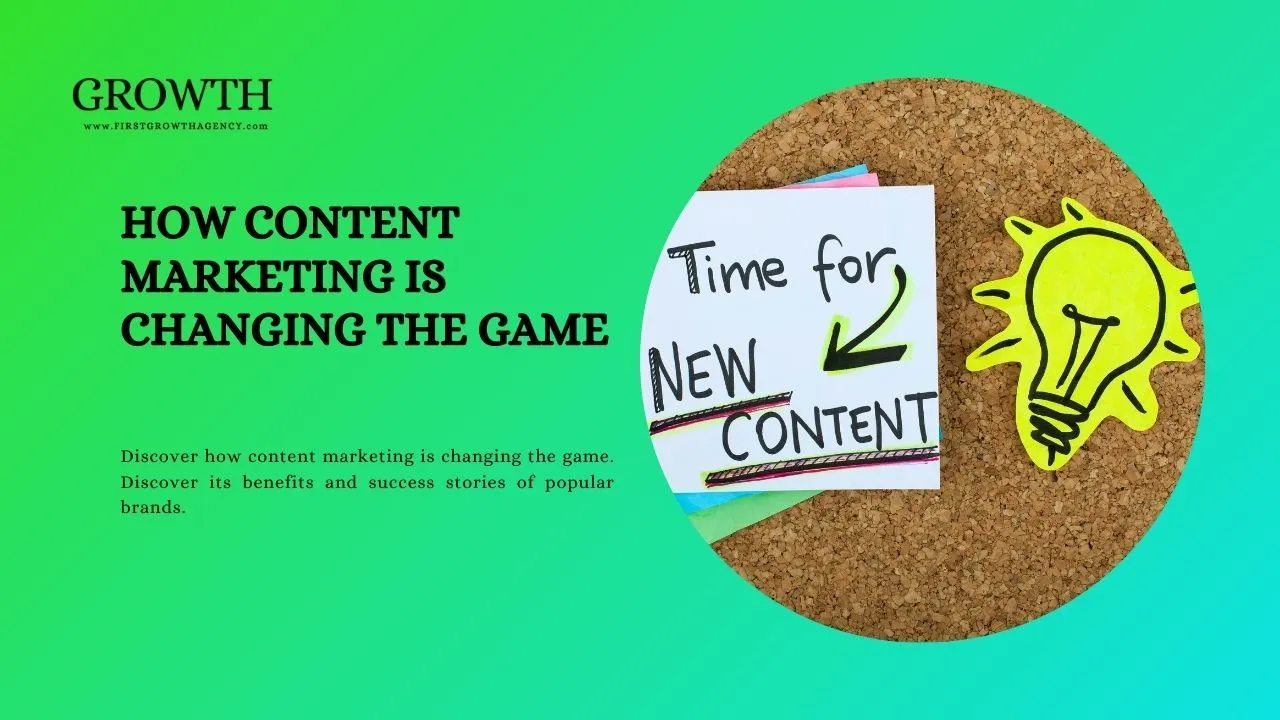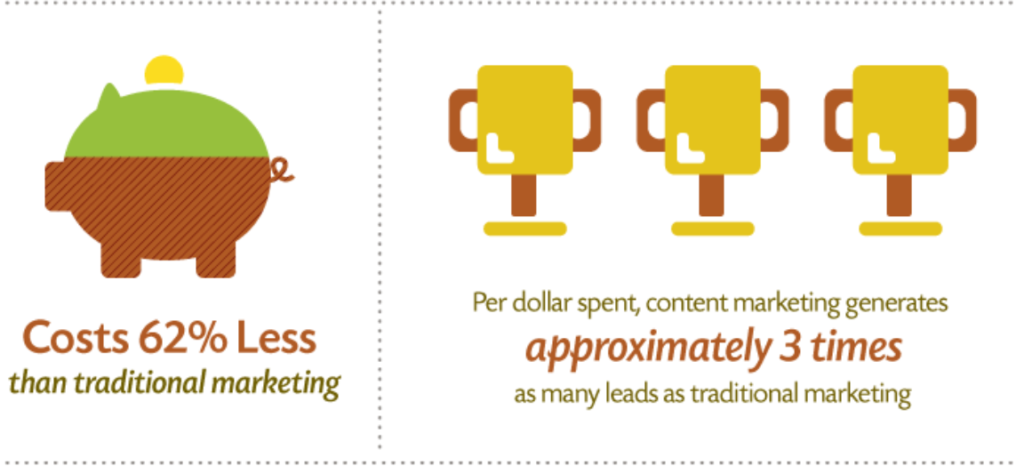In today’s digital world, content marketing has become a key strategy for building strong relationships with customers. Surprisingly, while 91% of B2B marketers use content marketing, only 28% say that their organization is extremely or very successful with content marketing. This gap shows a big chance for companies to better match their content with what their audience needs. Effective content marketing does more than push products – it builds communities and deepens loyalty with the brand. In this article, we’ll discuss about what is content marketing and how content marketing is changing the game.
What Is Content Marketing?
Content marketing is a strategic marketing approach of creating and distributing valuable, relevant, and consistent content to attract and retain a clearly defined audience – and, ultimately, to drive profitable customer action. Where traditional marketing aims to encourage the immediate sale of goods or services, content marketing attempts to build long-term brand awareness, establish businesses as leaders in their respective fields, and foster a strong relationship between business and customer.
Content marketing involves sharing valuable information pertinent to that level of expertise in the form of articles, videos, newsletters, and podcasts – sometimes in many more ways than those. Content marketing works particularly well in today’s world because consumers are literally bombarded by hundreds of thousands of advertising messages weekly and find themselves suffering from ad fatigue.
How Content Marketing Is Changing The Game:
In a world overwhelmed by irrelevant advertisements and commercials, brands are increasingly focusing on strategies that foster trust and deliver meaningful value. Content marketing stands out as a pivotal approach that not only enhances brand reputation but also engages customers in a more profound manner.
Below are several key points illustrating how content marketing is revolutionizing the marketing landscape:
Content Marketing: The Present and Future of Marketing:
Content marketing has become an integral component of effective marketing strategies, transcending beyond a mere trend. According to recent studies, 70% of B2C marketers and 73% of B2B marketers now regard content marketing as a central element of their marketing efforts. This shows that there is a shift to creating valuable content which is relevant to the needs of the consumers and which helps in more visibility of the brand instead of advertising in the traditional form.
It Drives Value, Trust, and Engagement:
Content marketing drives enormous value, trust, and engagement, thereby providing great ROI. New data states clearly that businesses good at content marketing show dramatically increased interaction and conversions. According to a study by Content Marketing Institute, 58% of B2B marketers reported that content marketing has been pivotal in increasing their sales and revenue over the past year. Another study shows that content marketing using AI yields a higher ROI, particularly when integrated with SEO enhancements, with 68% of businesses observing a higher ROI.

It Is Cost-Effective:
Content marketing is effective, but more importantly, it is very economical. Evergreen content, content that continues to be relevant for a long time, can continue to draw leads to a website without it incurring additional costs, unlike in the case of traditional marketing, which needs to be invested in all the time to keep drawing traffic. This feature is what makes content marketing an option that even businesses can afford. Notably, content marketing is proven to be 62% cheaper than traditional marketing methods, while at the same time generating three times as many leads. The cost-efficiency feature, combined with the impressive ROI – businesses that employ content marketing strategies get the conversions six times more than non-content marketing strategies – make content marketing an option with beneficial long-term impacts.

It Leads to Increased Sales and New Traffic:
Content that is based on the interests of the users enhances their likelihood of conversion. For example, SEO optimization increases the visibility on search engines, which is a critical aspect that cannot be ignored as 68% of online experiences start with search engines. Moreover, businesses that prioritize content marketing report an increase in sales, attributing this growth to their strategic content initiatives.

Content Marketing Helps Build Your Reputation
A good content marketing strategy goes a long way in building your reputation and placing your brand as a leader in the market. This is necessary for credibility to be created and for appealing to those consumers who value trust and knowledge more than anything else.
Studies solidify the fact that content marketing plays a leading role in the reputation and consumer perception that are created. For example, 81% of consumers say they need to trust a brand to make a purchase, and a consistent brand presentation across all platforms can increase revenue by up to 23%. This means that content marketing is the primary booster of brand consistency and trust, and at the same contributing to a more prominent market presence and higher sales.
Moreover, thoughtful and engaging content is a strong driver of customer behavior, with 86% of consumers valuing authenticity when deciding which brands, they support. This indicates that genuine and well-crafted content can foster deeper brand connections and loyalty – the key concept of long-lasting customer relationships.

Receptiveness and Trust in Times of Economic Uncertainty:
During economic downturns, consumers become more cautious and selective with their spending. Brands that consistently engage with their audience through thoughtful content can maintain a sense of reliability and stability, which is particularly appealing in uncertain times. This approach helps in retaining customer loyalty and attracting new clients who are looking for trusted brands.
Examples Of Content Marketing:
Below are a few content marketing examples/ case studies from popular brands:
1. Airbnb Referral Program:
Airbnb referral marketing strategy led to a 300% increase in sign-ups and bookings within the first 30 days.
2. LOJEL Affiliate Marketing:
LOJEL affiliate marketing efforts resulted in a 96% increase in revenue quarter over quarter through strategic partnerships and performance monitoring.
3. SAP Content Marketing Across 19 Segments:
SAP content strategy focused on different customer segments to promote their ERP solutions effectively, resulting in nearly $4 million in sales from marketing-generated opportunities.
4. Lead Pages Inbound Marketing:
By utilizing inbound marketing strategies and a small, efficient content team, Lead Pages acquired 35,000 customers in less than three years, proving more effective than traditional sales techniques.
Conclusion:
Content marketing is positively the most significant part of the modern marketing mix that holds the potential to persuade consumer behavior, enhance brand value, and make business in today’s day and age. Brands can engage profitably with their customers, position themselves as thought leaders in the industry, and build trust among their customers by creating and distributing valuable, relevant, and consistent content or by taking content marketing services. Content marketing not only engages with the consumer, but in comparison to old marketing techniques, it also gives far better ROI. From the above-mentioned case studies about Airbnb and SAP, it is obvious that persistent high-quality content can work towards customer loyalty and ultimately sales. As brands get into the Digital Age, successful and sophistic content marketing strategies will be the key to long-term success.
FAQs:
Q1: What is content marketing?
Content marketing means creating and sharing valuable, relevant, and consistent content to entertain and retain a clearly defined and understood audience. It’s intended to drive profitable action from customers.
Q2: How does content marketing build brand reputation?
By establishing your brand as a thought leader in your industry, boosting your credibility, and gaining your audience’s trust, it actually conveys practical information relevant to the needs and interests of your targeted audience.
Q3: Can content marketing help reduce marketing costs?
Yes, it is cost-effective compared to traditional marketing platforms, and frequently, it provides returns on investment since it has the ability to engage for a longer period and considerably generate leads in the long run.
Q4: What types of content prove to be most effective in content marketing?
Blogs, videos, infographics, case studies, and social media posts, depending on the target audience and the campaign goals. Read content creation tips to create different types of content.
Q5: How does content marketing influence consumer behavior?
Since content marketing educates and engages customers, it may help influence their choice of what to purchase and build brand loyalty or encourage brand advocacy.
Q6: What role does SEO play in content marketing?
It serves to make the content visible in search engines, which in turn drives organic traffic to the brand’s digital pathways and enhances the level of engagement and ultimately conversions.
Q7: How can a brand measure the success of its content marketing?
Success can be measured based on metrics such as web traffic, lead generation, rate of conversions, rate of engagements on social media, and general ROI.








